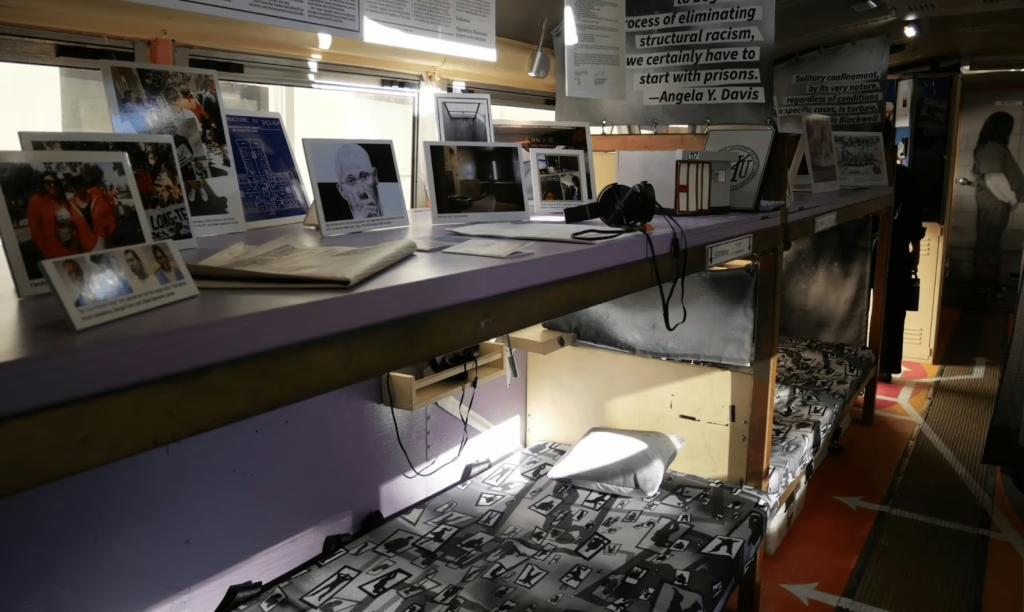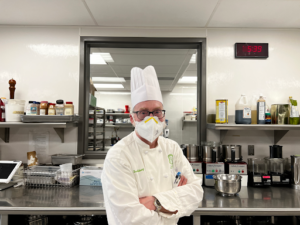In raw and painful testimony, survivors of solitary confinement gathered at Town Hall Seattle on Sept. 14 to deliver a message: isolation cells inflict lasting trauma, and the practice must end.
The storytelling event was a stop on the Journey to Justice Bus Tour, which features a repurposed school bus outfitted as a traveling advocacy hub with interactive exhibits and a life-sized solitary cell.

A sentence that never ends
The evening’s moral challenge was framed by a recorded message from incarcerated journalist Christopher Blackwell, who is serving a 45-year sentence for taking a human life.
“Do you think we should torture our fellow humans?” Blackwell asked. “Is that something, as a society, we want to condone?”
Eugene Youngblood, who spent nearly 30 years behind bars before his release in 2021, described solitary confinement as a punishment that never truly ends.
“Sometimes even when you’re free, you feel like you’re in solitary because of the trauma it puts on you,” Youngblood said.
Anthony Blankenship, who also served time, said: “Solitary confinement does not leave you when you get out; it follows you. When we are talking about decarceration and ending the prison system as it exists, we’re not trying to work on these systems of harm; we’re trying to replace them with systems of healing.”

Anthony Covert, who served 16 years, asked the audience to recall the COVID-19 lockdowns—and then to multiply them.
“Think about when you were sitting in your house, and you couldn’t leave,” Covert said. “Now let’s multiply that by 10. Let’s take all the stuff out of your house, take away FaceTime, take away the ability to pick up the phone or step outside for fresh air—just leave you in a room with nothing. [Solitary confinement] is the most dehumanizing thing I’ve ever experienced.”
Jessica Phoenix Sylvia, a transgender woman who spent more than 18 years in men’s prisons, condemned the euphemisms officials use to describe the practice.
“They’ll repackage it, they’ll call it restrictive housing or administrative segregation, they’ll say it’s not punishment,” Sylvia said. “Then why does it feel like punishment?”
David Heppard, released after 24 years, called solitary confinement “real torture.”
“Sometimes folks talk about the trauma that we’ve had before [incarceration], but we don’t talk enough about the traumas that we carry from incarceration,” Heppard said.
The push for legislation
These testimonies fuel a legislative campaign in Olympia. State Rep. Strom Peterson, who has introduced bills to prohibit solitary confinement, pointed to an ethical contradiction.
“[In the United States,] it is unethical to use mice or lab rats to study the effects of isolation,” Peterson said. “We treat people in our prisons worse than we are allowed to treat lab rats.”
A 2024 report by the state Office of the Corrections Ombuds found that more than 3,000 incarcerated people in Washington had spent over 120 days in solitary or other forms of restrictive housing during fiscal year 2023. The report also documented more than 170 suicide attempts and 14 deaths by suicide in solitary confinement over the past decade.
While Washington prohibited the practice for juveniles in 2020, adults remain subject to prolonged isolation. The Department of Corrections has launched a “Solitary Confinement Transformation Project” to reduce use by 90% over five years.
For those who endured it, that pace is not enough.
“You can’t deny that it’s torture, and you can’t justify it,” said advocate and law professor Deborah Zalesne.
A movement beyond Washington
Organized by Look2Justice, Unlock the Box, End Solitary WA, and other advocacy groups, speakers hope Washington can lead the nation in ending a practice they call torture.
“The more we share people’s experiences, the more we expose everyone’s humanity,” said Youngblood. “And when we center a person’s humanity, we get to see that we are much more alike than we are different.”
From inside prison, Blackwell urged the public to act.
“We can empower the most impacted voices to share their stories and humanize,” Blackwell said. “Because when we humanize, it becomes very difficult to dehumanize.”

Danika is an aspiring journalist based in Seattle. Born and raised in Jakarta, she has long been drawn to the gravity of stories—the way they hold what might otherwise slip through the day. As editor-in-chief, she approaches her work with curiosity more than certainty, trusting small details to reveal larger truths. For her, storytelling is less about control than attention: a practice of listening closely and noticing what remains after the noise.







Be First to Comment